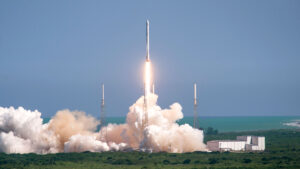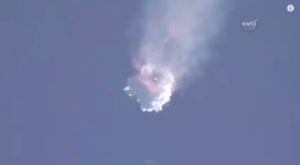‘Too Early To Assess Any Impact’ Of Musk Launch Failure on National Security Space
Posted on
WASHINGTON: Boom. The explosion that destroyed CRS-7 as it headed to orbit could mean Elon Musk’s fevered efforts to win the highly lucrative business of sending intelligence and Air Force satellites into space are, if not endangered, then at least in question.
While the failure of SpaceX’s resupply mission to the International Space Station isn’t directly tied to national security launches, the certification process his company underwent included all launches and their reliability — except this one.
So far, the Air Force is being extremely cautious in its response. “At this time it’s too early to assess any impact that the Space X launch failure has on future DoD launch missions. The Department is firmly committed to smoothly transitioning our launch enterprise with a continued strong focus on maintaining assured access to space for National Security Space missions,” a deliberately anonymous spokeswoman said in an email.
The conventional wisdom of launch watchers is that the Obama administration really really wants Musk to succeed and is willing to give him leeway that others might envy. On top of that Musk has sued the Air Force over its launch contracts, sending a very clear message that he believes he has the political and legal support to challenge the organization whose supplier he wants to be, (The suit was settled in January, with the Air Force agreeing to open the EELV program to Musk and to “work collaboratively with SpaceX to complete the certification process in an efficient and expedient manner.”) In the cozy world of defense contracting, companies very rarely sue their customer, reasoning that lobbying and rational arguments can usually win the day.
The Air Force has, so far, declined to answer my questions about the certification process and whether a company, once certified, can lose that certification. Several experts I spoke with — none of whom were willing to be identified in any way — said it was not clear whether a company could be, in effect, decertified.
Even if Musk can’t be decertified, you can be sure Air Force Space Command will press his company for data about whatever caused the failure and whatever fixes are instituted. AFSPC is almost certain to scrutinize the processes his company used for quality and launch assurance to make sure they didn’t miss anything during the certification process.
One thing to keep in mind: What would have been the result of the process if this launch had occurred during certification. At best, several experts told me it would have added a great deal of time to the Air Force’s review of how Musk makes his rockets, mates the stages and ensures quality control and launch assurance.
But SpaceX is certified. It has suffered a catastrophic loss that appears to have been caused by “an overpressure event in the upper stage liquid oxygen tank approximately 139 seconds into flight.” Before SpaceX lofts any humans or multi-billion-dollar spy satellites into orbit, let’s hope everyone in industry and government does their jobs to the utmost and grants no quarter to anyone in pursuit of safe and reliable launch.
Subscribe to our newsletter
Promotions, new products and sales. Directly to your inbox.


